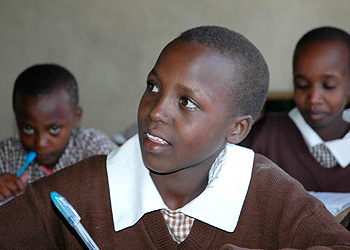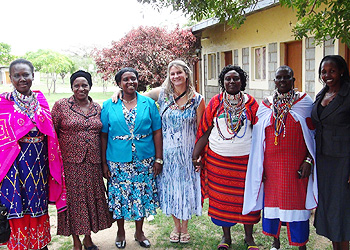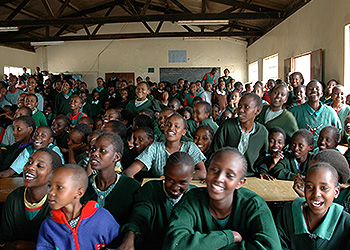 The Maasai Girls Education Fund works on-the-ground with the Maasai community to overcome the economic, social, and cultural factors that prevent girls from getting an education. In partnership with the community, MGEF has developed a comprehensive strategy to get more girls enrolled in school and to keep them in school until they have the knowledge and skills to enter the workforce in Kenya.
The Maasai Girls Education Fund works on-the-ground with the Maasai community to overcome the economic, social, and cultural factors that prevent girls from getting an education. In partnership with the community, MGEF has developed a comprehensive strategy to get more girls enrolled in school and to keep them in school until they have the knowledge and skills to enter the workforce in Kenya.
Strategies for Overcoming Barriers
 The Maasai Girls Education Fund has developed a multi-faceted strategy to overcome the obstacles Maasai girls must overcome to get an education. These strategies focus on increasing enrollment, reducing early marriages and circumcision, providing the means for economic independence, and ting cultural acceptance of educating girls and its economic benefits.
The Maasai Girls Education Fund has developed a multi-faceted strategy to overcome the obstacles Maasai girls must overcome to get an education. These strategies focus on increasing enrollment, reducing early marriages and circumcision, providing the means for economic independence, and ting cultural acceptance of educating girls and its economic benefits.
Increasing enrollment
MGEF, through a volunteer network of community advocates for girls’ education, identifies young Maasai girls who will never have an opportunity to go to school and, after obtaining permission from parents, enrolls them in a boarding school with proven high standards of performance. Equally important is sustaining the number of girls who are already enrolled in school that would be forced to drop out against their wishes because of cultural reasons, such as early marriage or the belief that girls do not need to be educated, or because their parents cannot afford the cost. Community advocates and educators are vigilant in their effort to identify these girls in time to keep them in school.
Enrolling in boarding schools
Physical barriers are removed and cultural barriers weakened by placing girls only in boarding schools. Physical barriers include the long, walks to local schools, which may be as far as 15 kilometers from a girl’s village, and disruptions of education caused by droughts and related tribal migrations of this pastoral culture. Boarding schools also mitigate the cultural barriers by giving girls a place to escape the relentless pressure for early marriage and motherhood to an environment supportive of girls’ education. In addition, boarding schools provide regular, nutritious meals, health care, structured time for study, and a housing option for girls who have reached puberty and are at risk of being married off.

Making a long-term commitment
MGEF is committed to the complete education of its students, from nursery school to post-secondary education, because our mission is to provide opportunities for economic independence, which requires that each student has the knowledge and skills to enter the workforce in Kenya, whether through vocational training or college. Our strategy is to ensure that MGEF-sponsored students remain in school as long as their desire and ability allow, including a post-secondary education in their chosen fields, but only where there is a viable job market in the in Kenya.
Maximizing the impact
MGEF selects students based on family and geographic diversity by limiting sponsorship to one child per family, except under special hardship circumstances, and by following a formula that ensures equitable selection throughout all locations in Kajiado County, Kenya. This strategy increases the reach of the benefits of educating our students and, therefore, the impact on the next generation will be greater.
Applying geographic and ethnic focus
MGEF is concentrating its effort in Kajiado County, Kenya, where approximately two-thirds of Kenya’s Maasai population lives. This area, which is about the size of the state of New Jersey, has one of the lowest school enrollment levels and highest poverty rates in Kenya, and education of women is the single, most effective way to alleviate poverty. By focusing on the Maasai, MGEF can address their unique cultural belief systems that prevent girls from being educated.
Partnering with the community
MGEF is structured to maximize community participation. MGEF works in cooperation with a community-based organization and members of the community throughout Kajiado County, Kenya to accomplish its goals. By involving the community, MGEF is able to incorporate the Maasai cultural perspective and local concerns into our strategies, and by doing so, gain greater acceptance of our mission, among men as well as women.
Empowering rural women
MGEF is developing a series of seminars for rural Maasai women who have no formal education, which focus on practical skills in areas such as health care, nutrition, agriculture, and business. Through this effort, the mothers, grandmothers, aunts, and sisters of our students will be gaining knowledge that will improve their lives and the lives of their families and communities. At the same time, the benefits of educating girls will be demonstrated directly and immediately, thus accelerating an increase in community support for education of girls.
Educating the community
MGEF’s Scholarships Program offsets many of the barriers to girls’ education, but not all. In addition to economic and cultural barriers, the spread of HIV, female genital mutilation, and teen pregnancy also contribute to girls dropping out of school. MGEF has created a Life Skills Program for girls, boys, mothers, and chiefs and elders to address the myths, misinformation, and customs about HIV and FGM, the social structure that makes girls vulnerable to teen pregnancy, and the benefits of educating girls.
